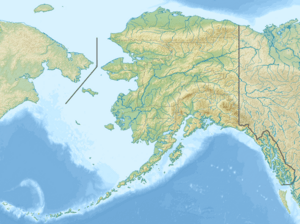Newhalen River facts for kids
Quick facts for kids Newhalen River |
|
|---|---|
|
Location of the mouth of the Newhalen River in Alaska
|
|
| Country | United States |
| State | Alaska |
| Borough | Lake and Peninsula |
| Physical characteristics | |
| Main source | Six Mile Lake 253 ft (77 m) 59°56′56″N 154°51′42″W / 59.94889°N 154.86167°W |
| River mouth | Iliamna Lake 3 miles (5 km) south of Iliamna 46 ft (14 m) 59°42′48″N 154°53′24″W / 59.71333°N 154.89000°W |
| Length | 22 mi (35 km) |
The Newhalen River is a river in Alaska, a state in the United States. It flows for about 22 miles (35 kilometers). The river starts at Six Mile Lake and ends in Iliamna Lake. This lake is about 3 miles (5 km) south of a town called Iliamna.
About the Newhalen River
This river is very important for fish. It is known for a huge number of sockeye salmon that swim up the river. These salmon travel upstream to lay their eggs. This happens every early summer. Besides sockeye salmon, you can also find rainbow trout here. These are popular fish for anglers.
River Journey and Challenges
Some people like to float down parts of the Newhalen River. They use rafts or kayaks for this adventure. However, the river can be very tricky. It has some very difficult sections of whitewater.
River Difficulty Levels
The difficulty of rivers is often rated using the International Scale of River Difficulty. This scale helps people know how challenging a river section might be.
- Class I means the water is easy to navigate. It has small waves and no real danger.
- Class IV means the water is very difficult. It has long, powerful rapids and requires careful maneuvering.
- Class V means the water is extremely difficult. These sections have very violent rapids and are only for expert paddlers.
The first 8 miles (13 km) of the Newhalen River, starting from Six Mile Lake, are Class I. This means they are easy to float. There is a place called Upper Landing where people can take their boats out of the water. Below Upper Landing, the river becomes much harder. It has Class IV and even Class V rapids. Because of these very difficult parts, the entire river is rarely floated from start to finish.
 | Percy Lavon Julian |
 | Katherine Johnson |
 | George Washington Carver |
 | Annie Easley |


